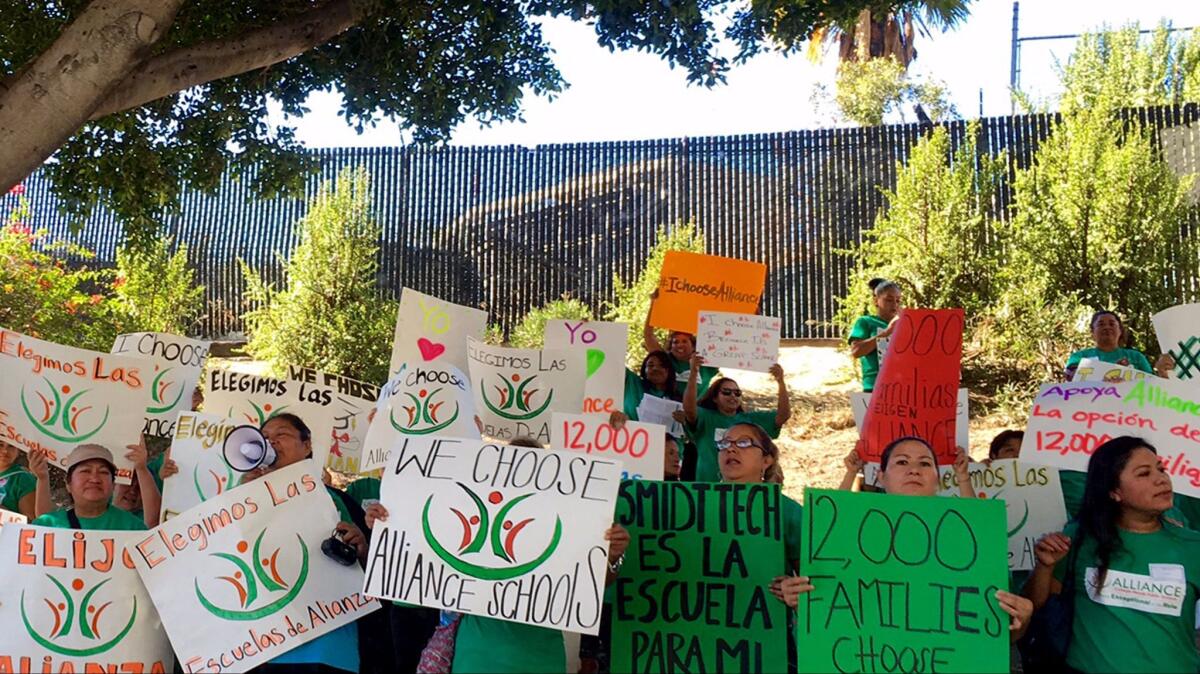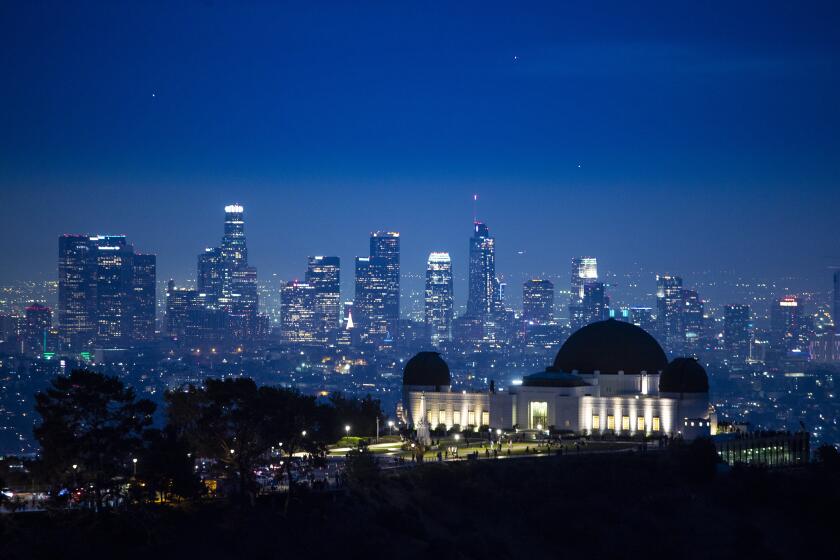Showdown looming between L.A. Unified and charter schools

- Share via
Los Angeles school district officials plan to recommend at the next school board meeting that 10 charter schools be shut down because they refuse to comply with district rules.
The district confirmed the recommendations Thursday.
For the record:
6:25 p.m. Nov. 2, 2017An earlier version of this post identified a Camino Nuevo charter school as among those recommended for shutting down. The Camino Nuevo charter is recommended for approval.
Charter school leaders, who say they are standing up against regulations they find onerous, won’t back down and will leave it to board members to decide their schools’ fates Tuesday.
They may get a sympathetic ear because the board majority is the first to be elected with major financial support from charter backers.
The futures of six other charter schools also are at risk over the same issues. All told, there have never been as many L.A. charter schools facing potential closure at one time — certainly never over conflicts they instigated.
If the charters don’t prevail, they still could appeal any denials to the county or state education boards.
Both the district and charter operators say they are looking out for students.
A key point of dispute is the authority of the district’s inspector general to conduct long-running investigations of charter schools. Charter operators want to narrow this power and say state law supports such limits.
They also want more legal rights to contest district decisions and more multiyear contracts to use district campuses. Current state law requires only one-year agreements.
More broadly, they contend that their schools suffer from having to navigate district policies that change frequently, often appear to be arbitrary and are applied inconsistently.
Having fewer rules, they say, would be in keeping with state law and the idea that charter schools should be less burdened by bureaucracy and thus freed to approach education more creatively and efficiently.
The five charter networks opposing the rules “are absolutely committed to making improvements to policy that are reasonable, straightforward and in the best interests of students,” said Cassy Horton, a managing director with the California Charter Schools Assn.
District officials praise the inspector general for rooting out criminal activity at a few charters and also for identifying poor practices, which then can be improved. The work of the inspector general and the enforcing of common-sense rules, they say, are essential to financial and academic accountability, according to L.A. Unified.
Both sides have compromised, but not enough to resolve the dispute.
The district’s charter division recommended denying renewed authorization to eight Alliance College-Ready Public Schools campuses and two Magnolia Public Schools campuses. Six KIPP (Knowledge is Power Program) schools may be reauthorized on the condition that they demonstrate compliance with district rules in the near future. KIPP administrators have not agreed to that condition.
Three proposed charters, which hope to open in the future, also are at risk in this dispute: one each from KIPP, Equitas Academy Charter Schools and STEM Preparatory Schools.
The board’s vote on the recommendations could be its most defining and important to date. In July, the new, charter-supported majority took control.
Charter operators felt the time was right to press for changes they consider long overdue.
“We remain hopeful that the LAUSD board on November 7th will do the right thing for students,” leaders of the five charter networks said in a statement.
Charter schools are privately managed, publicly funded and exempt, under state law, from some — but not all — rules that apply to traditional schools. L.A. Unified has imposed regulations of its own, as have other districts.
L.A. Unified officials say that they’ve developed their charter rules and policy over two decades of experience and that their approach has made the school system a national model for charter oversight. The rules, they argue, have helped make many charters successful and kept them publicly accountable. With 224 independent charter schools, the district is California’s largest charter authorizer.
“We’ve learned a lot of lessons with our schools,” said Jose Cole-Gutierrez, director of the charter division. “These are lessons learned to try to be helpful, not to try to undermine any autonomies.”
The board majority could side with charters and overrule the staff recommendation, but such a move — which could be seen as reducing oversight — could come with political blowback if Ref Rodriguez is the deciding vote.
Rodriguez faces criminal charges of political money laundering. Separately, Partnerships to Uplift Communities, the charter network he co-founded, recently reported possible conflicts of interest involving Rodriguez and $285,000 in payments that he allegedly authorized when he was a senior executive at PUC.
Rodriguez, who has denied any wrongdoing, left his job at PUC Schools when he joined the L.A. school board in July 2015.
In all, 28 existing charter schools are coming up for renewal, and four new ones will be seeking authorization. Two negative recommendations, for a proposed charter and for the North Valley Military Institute, will be based on factors other than the dispute over district rules.
UPDATES:
6:25 p.m.: This article was updated with additional details about the district’s recommendations on certain charter schools.
This article was originally published at 3:05 p.m.
More to Read
Sign up for Essential California
The most important California stories and recommendations in your inbox every morning.
You may occasionally receive promotional content from the Los Angeles Times.











